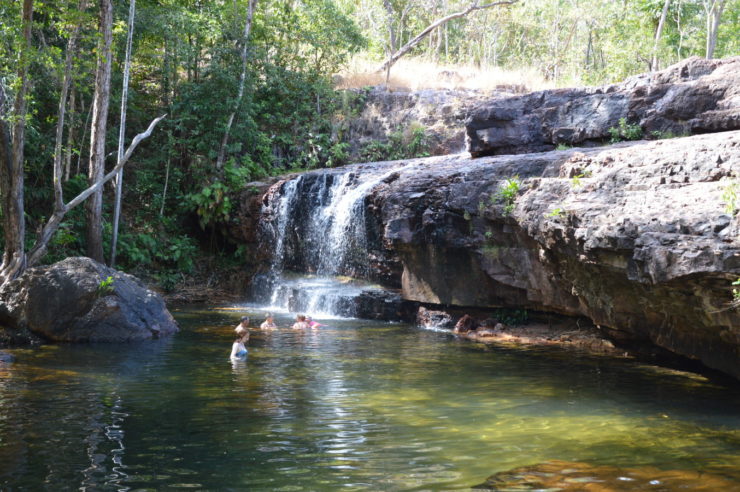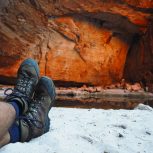Can you swim in Kakadu?

Can you swim in Kakadu?
Posted on
Wild swimming is a concept that is coming back in popularity in recent years. And we can see why; who doesn’t love the idea of bathing between rocks in crystal clear, or turquoise coloured pools. Perhaps under the shade of a gum tree.
Kakadu, in the Northern Territory, is the king of swimming opportunities amongst nature. A trip here isn’t complete without visiting a swimming spot. The beautiful waterfalls, creeks, and stunning rock formations all create one serene setting for a swim.
Add to this; one-third of Australia’s bird species which dwell in Kakadu, plus wallabies, crocodiles, wild horses, and buffalo that live around.
The question; is swimming in the National Park a Kakadu, or a Kakadon’t?
Is it safe to swim in Kakadu?

The answer is a; yes you can! But with caution and never alone. You can download the Parks Australia Kakadu water safety guide here for more information. Danger levels can vary depending on it being wet or dry season and many areas are closed off during the tropical wet season.
Some quick water safety tips;
- Observe all safety warning signs in the park (especially those displaying Crocodiles)
- Always be aware of your surroundings
- Maintain a safe distance from the waters’ edge
- Be alert to changes in the weather as flash flooding can occur causing dangerously rapid currents
- Be careful when walking around the waterfalls and rock pools as these areas can be very slippery
- Be aware that submerged rocks and parts of trees may pose a severe risk
- Be aware that water in rock pools in Kakadu can be extremely cold and can induce shock, especially on hot days
- Confident swimmers should also enter pools with reserved confidence
Forget two seasons; Kakadu has six!
So when is the best time of year for a swim?
You may be familiar with the classic 2 seasons of the Northern Territory; (April to October) and the wet tropical summer (November to March).
But Kakadu’s traditional owners recognise six different seasons based on thousands of years of local knowledge.

Kudjewk – Monsoon season (‘Raining crocs and dingoes’ season)
December to March. 24°C – 34°C
The wettest month of the year, you’ll experience a true tropical summer – thunderstorms, heavy rain, and flooding when you visit during this time. You might think more water = more swimming; sadly this is NOT THE CASE!
Many areas and roads inside Kakadu will become inaccessible. Waterfall sites become gushing torrents, and the local waterhole is now a fast-moving stream.
Bangkerreng – Storm Season (‘Knock ‘em down season)
April. 23°C – 34°C
The skies clearing and the rain is halting. Most of the floodwater begins to recede back and streams start to run clear again.
The early days of Bangkerreng are marked by violent, windy storms that flatten the speargrass – these are called ‘knock ‘em down storms’. Not the perfect time to visit Kakadu (especially if you’re Mary Poppins).
Yekke – Cooler season (‘Cool down season’)
May to mid-June. 21°C – 33°C
This is a relatively cool time with less humidity. And is a great time to visit Kakadu.
Wurrkeng – Cold weather (‘Cool, by NT standards season’)
Mid-June to mid-August. 17°C – 32°C
This is the coldest time to visit – at least by Northern Territory standards. Humidity is low, while daytime temperatures are around 30°C and drop to about 17°C at night.
This is a great time for a swim, plus catching sight of migratory birds.
Kurrung – Hot dry (‘Where is the air-con season’)
Mid-August to mid-October. 23°C – 37°C
Kurrung is hot and dry. It might be a little too uncomfortable for spending too much time outside, and a lot of spots dry up during this period.
Kunumeleng – Pre-monsoon (‘light-up-the-skies season’)
Mid-October to late December. 24°C – 37°C
Kunumeleng is the pre-monsoon season, with hot weather that becomes increasingly humid. It can last from a few weeks to several months.
How to be Crocwise – Crocodile safety
Will I see a crocodile?
According to the Parks Australia website, there are around 10,000 crocodiles in Kakadu – that’s 10% of all the crocs in the Northern Territory!
Freshwater and ‘salties’ (saltwater crocodiles) are both found in the area. Freshwater crocs measure up to three metres long, while male saltwater crocs can grow to a whopping six metres and weigh in at more than 1000 kg!
Generally, freshwater crocodiles are harmless to humans.
Remember that wherever there is water, there might be crocodiles. Be careful near rivers and billabongs and pay attention to croc warning signs.
As areas flood, crocodiles have access to different pools. When the dry season hits, the first part of the season involves rangers visiting each pool to determine the level of threat and signing the area accordingly.
What is the best way to experience Kakadu National Park (in our opinion)
The best way to stay safe and enjoy all the swimming spots around Kakadu is to take a guided tour of the area. That way you will be taken to the creme-de-la-creme of swimming holes in the safety of a group and trained guides (to guide in Kakadu, you need a special accreditation).
We have run a wildly popular 7-day tour of the region, that gives you the benefit of 2 knowledgeable (and accredited) guides that know all the best swimming holes in the area. Not to mention organized food and accommodation so that all you need to think about are what bathers to pack for the trip!
Check out the tour and all departure dates here – Kakadu National Park Walking Tour




